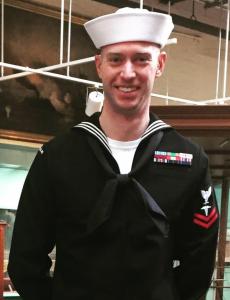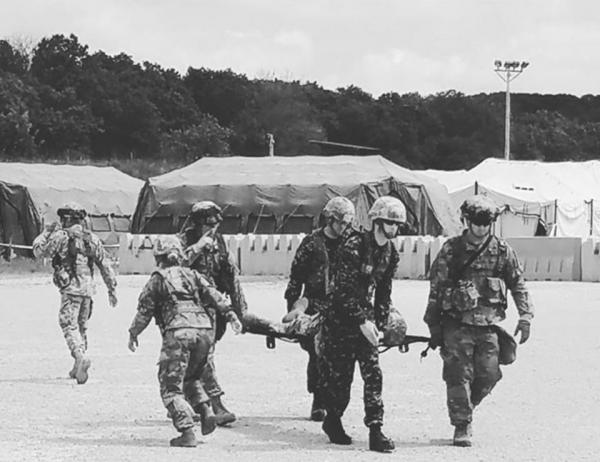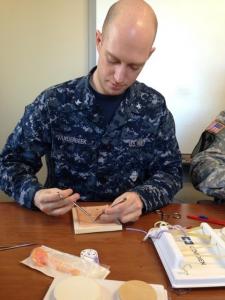Students who serve: David Vander Beek, U.S. Navy
 David Vander Beek was finishing a bachelor’s degree in health care systems administration at Ferris State University in 2008 when a brief moment of helplessness pushed him into the nursing profession and ultimately to the University of Michigan as a student in the School of Nursing’s master’s program in Leadership, Analytics and Innovation.
David Vander Beek was finishing a bachelor’s degree in health care systems administration at Ferris State University in 2008 when a brief moment of helplessness pushed him into the nursing profession and ultimately to the University of Michigan as a student in the School of Nursing’s master’s program in Leadership, Analytics and Innovation.
“I realized I wanted to be a nurse when I witnessed a man having a heart attack during an internship at a hospital,” he remembered. “I had a strong desire to help but lacked the necessary skills. Following that event and my graduation, I did some soul searching. I knew that I wanted more direct patient contact and I would need to complete the prerequisite courses to pursue nursing.”
Vander Beek grew up with a respect for health care professionals and the Armed Forces — his grandfather served in World War II, and most of his family members work in nursing, dentistry or government. Motivated by a desire to travel and serve his country, it became clear that joining the military could be an ideal opportunity. After researching different branches, Vander Beek decided to join the Navy as a hospital corpsman (HM) in 2010.
The hospital corpsman, or “devil docs,” are the Navy’s version of medics or health technicians, recognized as highly skilled health professionals who fulfill roles as nursing assistants, surgical technicians, pharmaceutical technicians and more for sailors and marines.
“Working as an HM allowed me to hone several nursing skills while working in clinics and hospital units, including labor and delivery, med-surg, laboratory, allergy and immunology, cardiac surgery ICU and oral surgery,” Vander Beek said. “Leadership opportunities have also allowed me to improve upon skills in management, conflict resolution and communication.”

After several years as a hospital corpsman, Vander Beek finished his active duty and transferred to the Navy Reserves while completing his Bachelor’s of Science in Nursing at the University of Maryland. He has been promoted to petty officer first class, holding various titles as assistant leading petty officer and leading petty officer responsible for managing hospital units and clinics. In the Navy Reserves, Vander Beek currently serves as unit leading petty officer at the Expeditionary Medical Facility for the Naval Operations Support Center, Detroit, in addition to his civilian role as an operating room nurse at Beaumont Hospital, Troy.
Vander Beek understands the similar roles that military and civilian nurses serve. He also recognizes that a military nurse’s distinct perspective and skill set can make them an important asset in any health care setting.
“Military nurses are trained to work in remote environments and be readily deployable to anywhere in the world,” he said. “Navy nurses serve to support any mission and can work with aircraft squadrons, the Fleet Marine Force, and on humanitarian missions, aircraft carriers and other hospital ships. Navy nurses are vital professionals with a wide variety of skills that make them valuable across the spectrum of care.”
Once unsure about his future, Vander Beek’s decision to join the Navy resulted in a rewarding health care career. His service as a hospital corpsman has instilled a set of principles that guide him today as a clinician and graduate student training to become a nurse leader.
“The Navy has given me a stronger sense of purpose, as well as an unshakable set of values of honor, courage and commitment,” he said. “Honor through the pride and privilege I feel for serving my country, courage through persistence to always do the right thing, and commitment to remain dedicated to quality patient care. I believe when you live those values every day, you will be successful in all aspects of life.”





